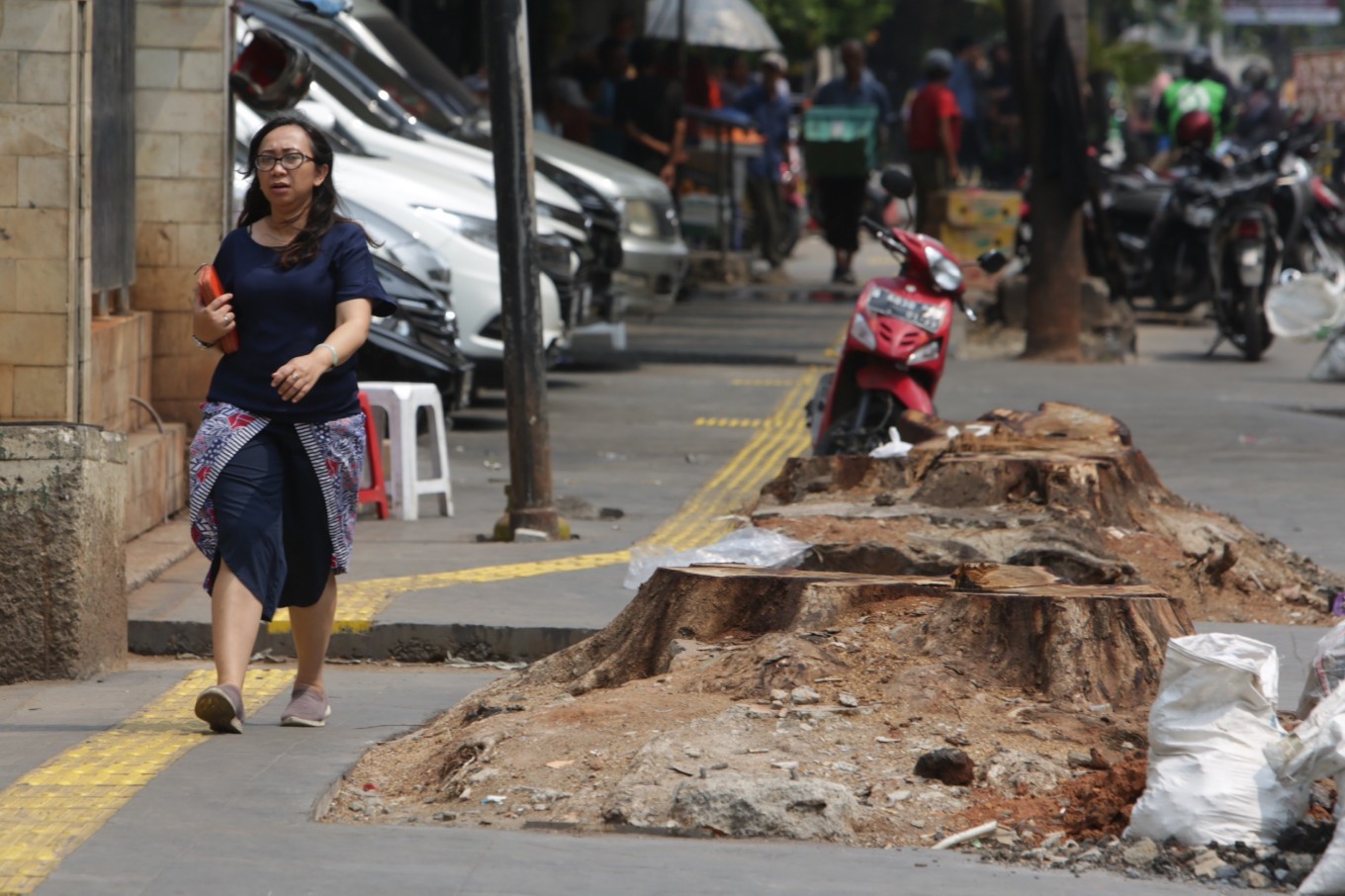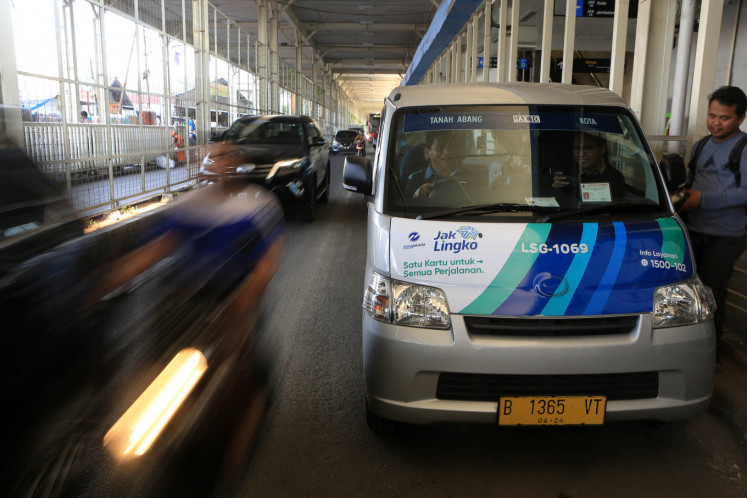Despite awards doubts linger over Anies’ transit policies
Urban transportation experts have reservations about giving credit to Jakarta Governor Anies Baswedan for his work on the capital's public transportation system.
Change Size

J
akarta Governor Anies Baswedan was recently named a 2021 Transportation Hero by the Transformative Urban Mobility Initiative (TUMI), a German-backed initiative focused on the endorsement of sustainable urban transportation.
His nomination has raised a few eyebrows with many analysts questioning whether he deserves the honor despite the Indonesian capital marking up some notable improvements under his watch since 2017.
Observers say there is still much left to be desired when it comes to untangling the city’s chaotic and piecemeal transportation system.
The former education minister’s most noteworthy achievement in this regard is his success in increasing the number of public transportation users through his administration’s flagship transit program called Jak Lingko, which allows commuters to use various modes of public transportation on one flat-rate fare.
Ridership on the city-owned bus operator PT Transjakarta increased by 22.9 percent in his first year in office, from 144.86 million passengers in 2017 to 187.9 million in 2018. The following year, this figure rose again to 265 million passengers, a 41 percent jump.
In February 2020, Transjakarta reached the 1 million passenger mark for daily ridership, just 16 years after the service was introduced onto the capital’s streets in 2004.
Needless to say, COVID-19 put a dent in this figure just a few months later, with ridership plummeting by 70-80 percent following the enforcement of mobility restrictions to curb viral transmission.
The uptick in Transjakarta’s ridership early on can be attributed to the success of the company in integrating thousands of privately owned angkot (public minivans) from all across the city under the Jak Lingko scheme.
Read also: Transjakarta wants 10,000 electric buses in service by 2030
The program allowed Transjakarta to provide first-to-last-mile public transportation for its passengers and significantly expanded the bus network.
At least 18 percent of Transjakarta passengers in 2019 came from the Jak Lingko angkot fleets with the company seeing a 329 percent rise in angkot ridership that year.
But Jakarta’s transportation options are no longer limited to the Transjakarta bus network.
In 2019, Jakarta launched the country’s first-ever modern subway system, MRT Jakarta, as well as its first light rapid transit (LRT) line, which are considered breakthroughs in Indonesia’s transportation history.
The MRT enjoyed huge success in its first year of operation, carrying around 20 million passengers that year and booking Rp 60 billion in profits.
Anies, however, cannot expect to take too much credit for the MRT and LRT, as both were initiated by his predecessors; the MRT in 2013 by then-governor Joko “Jokowi” Widodo and the LRT in 2015 by Basuki “Ahok” Tjahaja Purnama.
That said, Anies integrated the MRT and LRT lines with other existing public transportation networks including the Transjakarta and the Commuter Line railway. To allow for more seamless commuting, Anies also revamped four busy transit points at Commuter Line stations last year.

To address the capital's severe air pollution problem, in 2019 Anies laid out a 63-kilometer bicycle lane network and revealed a plan to add 500 km more.
Read also: Curbing transmission on public transport not as simple as banning passengers: Experts
He also issued regulations requiring all motorized vehicles over three years old to undergo annual vehicle emissions tests in September last year.
Last October, Transjakarta also finished a three-month trial run for two electric buses running on the Blok M–City Hall route, with the city planning to officially launch it this year.
TUMI praised Anies’ programs, complimenting him for "creating fair, affordable and inclusive transportation for all" and providing “steady transit improvements" amid scarce resources due to the COVID-19 pandemic.
The organization also announced that Jakarta had recently come out as the winner of the global 2021 Sustainable Transport Award (STA) for its ambitious integrated public transportation programs, with Indonesia becoming the first-ever Southeast Asian country to have received the prestigious award.
However, not everyone is convinced that Anies can take the credit.
Djoko Setijowarno of the Indonesia Transportation Society (MTI) said Anies had yet to deserve the title as he simply continued programs initiated by his predecessors.
He has also not been able to tackle one of Jakarta’s biggest outstanding problems: traffic congestion.
"Calling Anies a transportation hero is too much," Djoko told The Jakarta Post on Thursday.
Read also: Be patient: Jakarta sidewalk revamp testing time for pedestrians
With some of the world’s worst congestion, Jakarta remains at risk of descending into complete gridlock.
In late January, the annual Traffic Index published by Dutch location technology company TomTom ranked the Indonesian capital the 37th-most-congested city in the world, although it had improved significantly from the 2019 index that saw Jakarta reach the top 10.
Djoko argued that while the city ranked better this year, it was mostly due to the onset of mobility restrictions in response to the pandemic. The city still saw traffic congestion every time restrictions were eased, he said.
Meanwhile, Southeast Asia Institute for Transportation and Development (ITDP) director Faela Sufa told the Post that while the governor had taken the right steps toward creating a sustainable transportation system, his existing programs in the capital still needed a lot of work.
For instance, the city's 63 km of bike lanes are not equipped with railings or boundaries that ensure the safety of cyclists and other pedestrians.
She also said that despite the launch of ambitious sidewalk revitalization projects, the invasion of pedestrian areas by motorists and illegal parking remained rampant. His odd-even license plate policy on major thoroughfares had also not been able to significantly discourage people from using private vehicles.
"Rather than treating the transportation hero title as an achievement, Anies should regard it as a trigger to work harder at creating a better transportation system for Jakarta," Faela said.









